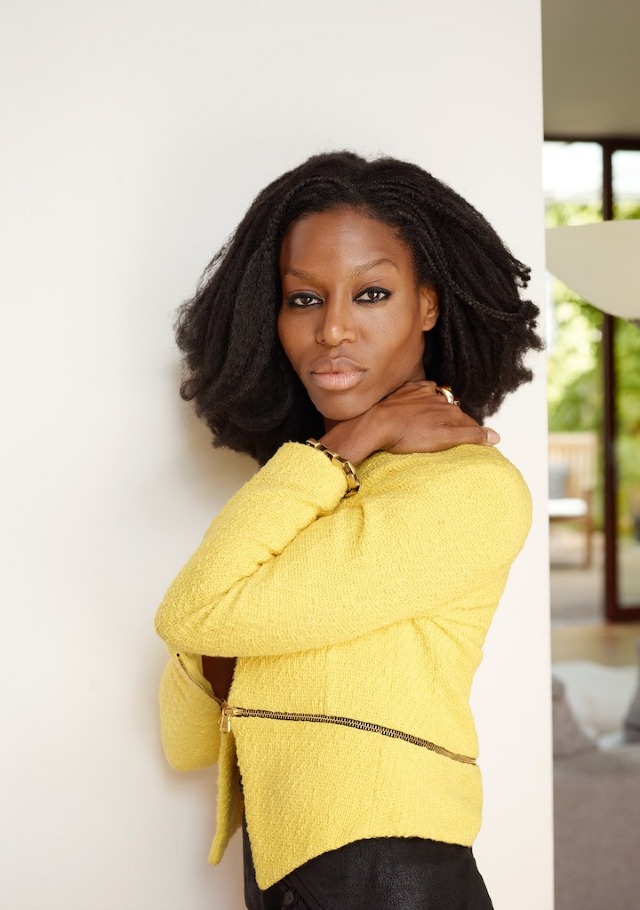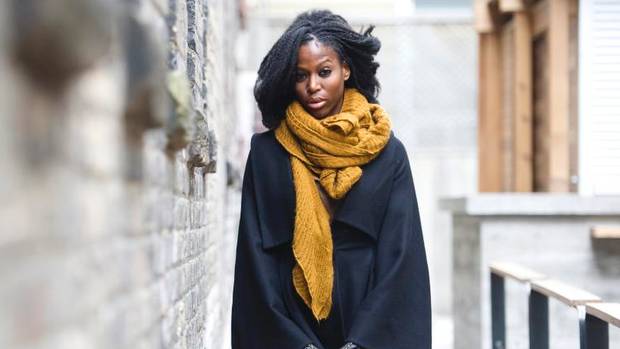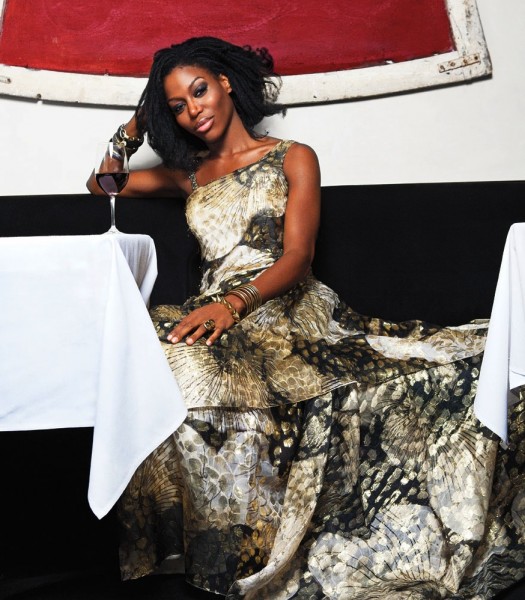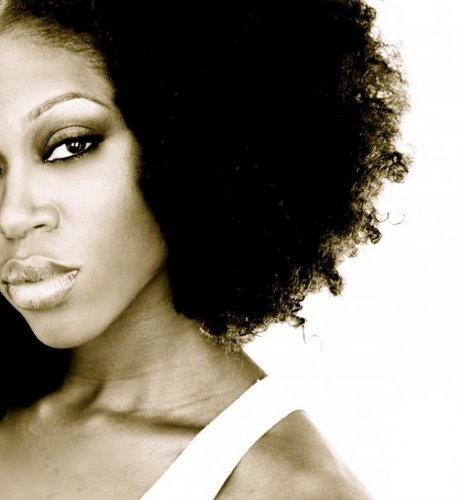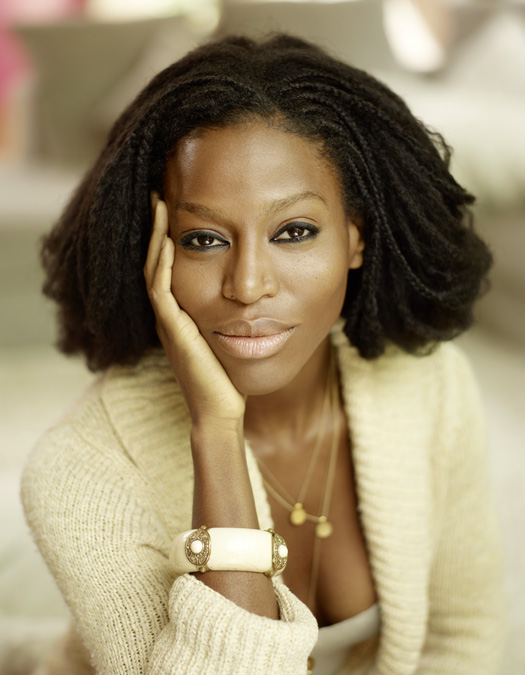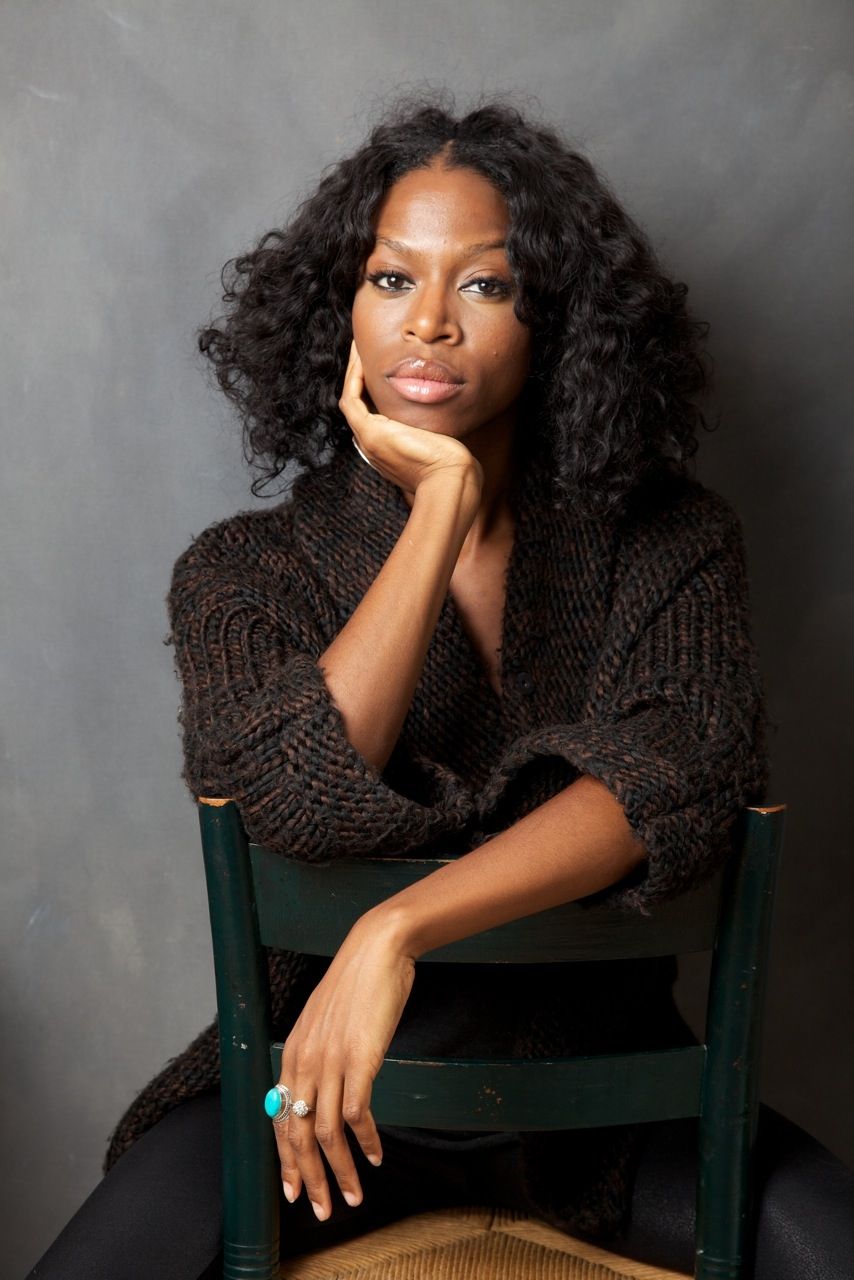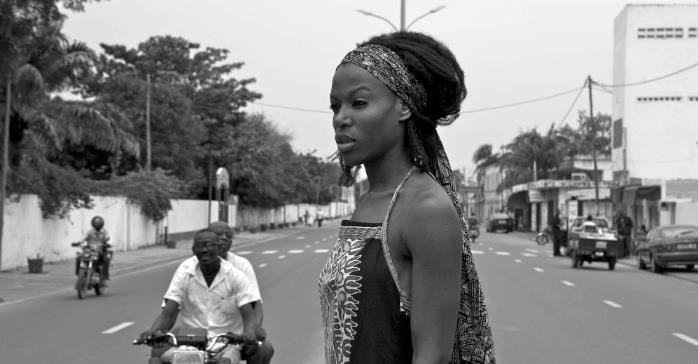__________________________
Published
Why Taiye Selasi is
‘not a normal literary lady’
JOHN BARBER – The Globe and Mail
Men stare, women stare, the waitress stares: Everybody in the too-trendy Toronto restaurant wonders who she is. The star in the room, the resplendent woman sitting by herself with a billowing cloud of dreadlocks on her head and electric-blue stilettos on her feet.
She is too commanding to be a model, something merely decorative, too distinctive to be a movie star whose name escapes. Nobody in this milieu would ever guess that Taiye Selasi is that frumpiest of all public figures, a literary novelist.
“This is something I kept being told,” she says. “‘You don’t look like a writer!’ And finally I said, ‘You know what, dammit? So be it.’”
“No,” Selasi adds. “I’m not a normal literary lady. I’m wearing electric blue shoes!”
More to the point, normal literary ladies don’t get sent on 21-city publicity tours to hawk their first novels, nor are they apt to see such efforts greeted with the fanfare that has attended publication of Selasi’s debut, Ghana Must Go. But the star-making machine knows it when it sees it, and Selasi is more than capable of playing the role.
Who is she? “I am an obsessive traveller,” she answers, “a lover of almost all forms of creative expression – music, painting, film, dance, literature. I am a little bit of a nerd so I study everything I love too much, beyond necessity. I am African.”
Selasi is currently living in Rome in a friend’s apartment near the Spanish Steps, “because I couldn’t find an apartment in Paris,” she explains. “I’m so happy now that I didn’t.”
Home is an open question. For the time being – and unlike so many writers – Selasi is delighted to be living on the road, talking books. “Some authors enjoy being with the work but not so much with the world,” she says. “I’m just not built that way. I love the work just a little bit more” – she gestures extravagantly as heads turn – “than I love the world.”
Although she is new to literary life, Selasi’s training for the spotlight began early. Born in London to a Ghanian mother and Nigerian father, both doctors, Selasi and her twin sister were raised by their mother in the affluent Boston suburb of Brookline with a mission to excel. She was by her own description “a championship student” whose training took her from an elite prep school to Yale and then Oxford, where she completed a masters’ degree in international relations before leaving academia to work, briefly, at a hedge fund on Wall Street.
Selasi’s upbringing mirrors that of the characters in Ghana Must Go, a family fractured by its many displacements yet burning with genius in every branch.
“My family is intimidating,” Selasi agrees, “especially to me!” She doesn’t want readers to think Ghana Must Go is her autobiography. “But that’s certainly something I know from personal experience, the sense of being in a family where everybody is an incredibly high achiever.”
So it was only natural that Selasi would find herself at Oxford one day confessing her secret literary ambition to Nobel Prize-winning novelist Toni Morrison.
“She gave me a deadline,” Selasi recalls. “She gave me a year to produce a manuscript of some kind to share with her.” The result was a short story, The Sex Lives of African Girls, that was published in the magazine Granta. Followed soon by the acquisition of one of the world’s top literary agents, Andrew Wylie, and a lucrative two-book deal with Penguin. Wall Street didn’t stand a chance.
Even before she became a novelist, though, Selasi had already acquired a grassroots following due to an essay titled Bye-Bye, Babar (Or: What Is an Afropolitan?)” in an obscure London magazine. Shared among thousands like an electronic samizdat, the essay landed back in her own inbox two years later – without a byline, but with the recommendation that “he [the presumed author] is a really good writer.”
“I wrote that essay intending really just to get a handle on my own identity, to get my own answer to the question, ‘Where are you from?’” Selasi says. But the generation she described – often the internationally raised children of parents who left postcolonial Africa in search of education and jobs – welcomed the label as its own.
“I describe myself as Afropolitan to suggest perhaps a more complicated African identity than the ones available to my parents’ generation,” Selasi says. She lays out the formula with practised ease:
“There are three criteria. Number one, some unbreakable bond to some country or countries in Africa. Number two, a global perspective. And three, a desire to effect change, however that manifests, in Africa for African people – in some way, somehow, at some point.”
She laughs like Joni Mitchell in Big Yellow Taxi. “That’s it!”
Reading Ghana Must Go, which deals with the same issues of identity as they intrude into the heart of a struggling family, suggests a more complex human reality. But it has no political purpose, Selasi insists, and she rejects comparisons with the work of other afropolitan writers.
She is delighted that Penguin has publicized her as “the next Zadie Smith” but frowns at comparisons with Chimamanda Ngozi Adichie, another U.S.-educated Nigerian author whose second novel, Americanah, is being published this spring.
“I’m not particularly interested in comparing myself to people because we are brown and female and well-spoken,” she says. Demography is not destiny. “I’ll be genuine – I don’t know where that impulse comes from, and more importantly I’m not quite sure I know where it goes.”
The “identity of consequence,” Selasi insists, “is the writing, not the writer.”
But she is also a photographer and filmmaker, currently raising funds for a documentary that will focus on the daily lives of young Africans. And in that role she is frankly political.
“It just thrills me to no end to think that people will finally be able to see an alternative vision of how young people live in African countries – an alternative to the rather redundant representations of war and famine and chaos and so forth,” she says.
But novels are different. “I reserve the right to write about whatever I want to write about,” Selasi insists. “I don’t think of novel-writing as an exercise in identity politics. I really don’t.
“I know I get dragged into that conversation a lot and that’s fine, because it interests me,” she adds. “I use essays for that. The documentary is for that.”
But not Ghana Must Go. “My novel,” she concludes, “is for itself.”
Defining Afropolitan
Afropolitans are “not citizens but Africans of the world,” Taiye Selasi wrote in the influential essay that gave birth to the term less than a decade ago. “You’ll know us by our funny blend of London fashion, New York jargon, African ethics, and academic successes,” she wrote at the time. “Some of us are ethnic mixes, e.g. Ghanaian and Canadian, Nigerian and Swiss; others merely cultural mutts: American accent, European affect, African ethos.”
Since then, the meaning of the term has expanded to include not only expatriates but also virtually any young, creative, urban person both within Africa and without. Membership is inclusive, Selasi says. “Lawyers, musicians, students, photographers, filmmakers, writers – Chinua Achebe, may he rest in peace – I drag them all into this network with me and say, ‘Let’s go change the places we come from.”
Leaders among the Afropolitan elite include architect David Adjaye, artist Chris Ofili and writer Chimamanda Adichie. Canadian novelist Carole Enahoro, of mixed Nigerian and British heritage, is a classic Afropolitan. So are such elder statesmen as musician Hugh Masekela and novelist Wole Soyinka.
__________________________
__________________________
Taiye Selasi: the burden
of the immigrant’s shame
Taiye Selasi’s debut novel “Ghana Must Go” was published recently to universal acclaim. The author, dancer, photographer and documentary-filmmaker of Ghanaian-Nigerian heritage talks to This Is Africa about why, as a writer, she is not afraid to be open about her family background.
TIA: You deal with intense themes in the novel: “parental neglect, sibling rivalry, racism, bulimia, paedophilia, allegations of professional misconduct…” How did each one come to you, and what part of your personal experience contributes to your ability to dig deep, or should I say excavate, these various narratives and explore them the way you’ve done?
Taiye: I’m not sure that Ghana Must Go is a…okay, let me say it like this, the novel does not feel to me like a summation of my own particular beliefs, opinions and feelings. It genuinely came to me as the story of this family, and it still feels to me like their story, but it does not take a genius to figure out there are similarities between my family and the Sai family. And some of the deeper emotional themes must be ones that I know for them to have come bubbling up so potently from my subconscious. At times, writing the novel was incredibly difficult. I remember I went through a phase, just at the end of the writers block before I started part two, where I started having nightmares, like really vivid, cinéma vérité nightmares. The events were simply fantastical and terrifying, but the locations were all locations from my childhood – Brookline, London…I could draw a line from what I was remembering to what was happening in the book. So that was traumatic, but thank god it stopped. I suspect some of those things were purged in the writing of the novel, but I don’t fully understand that part of the process and that’s why I say I’m not a good psychoanalyst.
Let’s talk about the burden of shame. Kweku Sai walked away from his family because of the shame he felt as a failed husband, father and doctor. Can you expand on that burden for us, and explain why you wanted to explore this particular theme from the point of view of an immigrant?
You know, writers don’t chose what stories chose them. These were the characters that grabbed hold of me. I tried to slip out of their grasp but I failed spectacularly. But that was really painful because I remember I wrote that scene and I was crying and I didn’t know I was crying. My mum – I was in her house in Accra – she came and asked, are you okay? I said yes, I am okay, and she was like, you have tears streaming down your face. Everything in Ghana Must Go feels true to me either because of what I know or what I have seen, and I think that shame and pride are huge parts of the migrant’s experience. You leave to make it, and that is a high price to pay – to leave something behind in order to become something else. So high that I think for a lot of us, especially West Africans, we feel that if we haven’t succeeded, we don’t deserve love, we don’t deserve home, and that’s not true.
You have been on tour with the book and the response has been great. When you meet people and they talk about the characters they recognise, does that freak you out?
No! No! It’s wonderful. It’s the most wonderful thing that has ever happened in this whole experience, better than the good reviews, better than the praise. A cab driver actually said to me in New York, are you Taiye Selasi? I said yeah and he was like“I’m so honoured you are in my cab. I love your book. I felt like you were talking about me.” That’s what you live for. That’s what you do it for. That’s what you dream of.
The title is provocative due to its political connotations. Did you expect the response it has generated so far and was it a play on words for you or what just came to you?
It’s what came to me. It was a creative instinct and I went with it and I’m happy I did, but to be honest with you, what has been more delightful than anything is to realise how many people know of that history, because I didn’t, and neither did any of my cousins; we all use the phrase “Ghana Must Go”, but none of us knew about its historical origins. So more than happy to sort of play with those things and, as you can see, I am happy to play with fire, Nigerian/Ghanaian tension, incest, change, eating disorder…I will take it all [laughs].
Let’s talk about injustice, one of the themes in book suffered by Kweku Sai. It is a recurring story from different quarters, immigrants experiencing various forms of injustice but not wanting to talk about it because we don’t want to rock the boat. Why did you take on this gigantic subject?
That’s what literature is there for, to rock the boats that you can’t rock in life. If you do it, you do it in literature.
Where there stories of injustice that influenced that particular part of the story you tell?
Again and again. I have had personal experiences, but not to the extent of Kweku’s firing. My mum and my twin and aunties and uncles. It’s funny because the last time I was in London, the cab driver who took me to the airport started telling me about his life before I said a word about the novel. He was fired as a surgeon here in the UK, but stayed in the country and became a taxi driver, but was trying to help Ghanaians come over to study medicine. He is such a beautiful soul and it’s such a heartbreaking story. I told him, I said I have written a novel about a Ghanaian surgeon who loses his job unfairly. He was so moved and I was so moved. So if ever there was a question about whether things like this really happen, he was a perfect example, driving my cab. Talk about the burden of shame and how you deal with it, this is it.

Let’s talk about the epic nature of the novel, Nigerian, Ghana, US and some elements of the UK. If I didn’t know you, I would think you studied geography but how much of the experience of the different places you have visited were you able to bring into the novel and let speak for itself?
I do have the MPhil in International Relations, remember [laughs]. People say that and I always joke. My grandmother came to my first reading here in London, and she was speaking to my publicist, and I had just written this piece about my family in the Evening Standard and I mentioned that my half-Scottish grandmother did flamenco in Malaga. So my Nana is sitting there and she is speaking Japanese to Jenny, because she has been to Tokyo and lived in London and Malaga. My whole family is peripatetic, all we do is move and travel and we love the world; we are natural explorers. If we had been born in a different time, we would probably have been conquerors too, and that’s just the family that I grew up in, but when I look at the Sai family, certainly in comparison to mine, I don’t think they move that much. Both Kweku and Fola do what most immigrants do and they don’t move again. They just stay in the US, until everything goes bust and Kweku goes back to Ghana, and so he has gone to two places in his entire life, which is point 0.005 percent of the places I went to last year. And Fola, she is the same. So from my perspective, funny as it may sound, I don’t think the Sai’s move around a lot. Their passports have far fewer stamps than mine, but their movement to me seems more emblematic of the traditional immigrant experience. So it’s not that exotic if you immigrated and your parents were born in one place and your grandparents in another.
Identity and racism are equally present in the book, and that brings me to the subject of being an Afropolitan, a term you coined back in 2005 when you wrote about your identity, and has since become the focus of debates on different platforms. It also brings Olu and Ling into the picture, Olu being the first son and child of Kweku and Fola Sai, and Ling the Chinese-American wife. Why was it important to you to explore their relationship the way you did in the novel?
Yes, Ling and the relationship with her father. You don’t often see it represented but one of my best friends from graduate school – she is Guajarati – and for the longest time, I never met her mum, and I kept wondering why I had never met her parents. Finally, she confided in me that her parents, Indian immigrants to the UK, held very prejudiced views of Africans, specifically African immigrants in the UK. And I thought, I know that, and in a way I knew…of course, she was constantly telling them that “oh, Taiye got the only distinction in her year” and “Taiye is such a blah, blah blah.” I just thought to myself that’s really funny because if I were white British or American and had graduated summa cum laude from Yale and got the only distinction in the year, her parents I’m sure would be thrilled to know of our friendship but instead, because I was West African, they weren’t. Now, I should say I have since met them and they are lovely people and have accepted me and so forth. But it’s not just them; it’s the way these things work. It’s the way that someone who comes from some place downtrodden is always looking to step on somebody else. and it’s tragic. That having been said, while Ling’s father embodies that, Ling herself does not. And Ling and Olu, in many ways, represent the heart of that Afropolitan experience. They are both very clear about who they are, and you know it’s a work in progress, that idea of who they are, but they see each other as people from the very beginning, they laugh about Asian stereotypes and they love each other.
You have been very open about your family and background. Did you consider any possible backlash before you started being so open?
I’m an open person. If everything is as it should be in my sort of natural state, I’m open. And I think that to be an artist, you have to be. The tricky thing is, the channels that you close in order to protect yourself or hide your past are the same ones that need to be open in order to receive your work and to tell a story, and so you can’t sort of have it both ways. And I think in many ways, what was preventing me from finishing the novel – this is going back some time – was that I was holding on to these sort of petty shames as if they were mine alone and not human and universal. As soon as I was willing to let those channels open, the novel came flooding through. First, the shame came pouring out and this is what I am referring to with the shame, nightmares and heartbreak, and the novel came flooding through, and as soon as that happens, you realise that it’s worth it. My father has done what he has done. My mum has done what she has done and my step-dad has done what he has done and my aunts and my grandmother too, but these are my people. These are the people who have populated my past and I embrace them for the people they are. I embrace them for their mistakes and hurts and shame as well as their trials and triumphs, and I think what’s powerful about that is not just the liberation that I feel in so doing. What I’m finding is that by saying my family, we are just rife with emotional disaster – I mean, we were having a party and my mum got up to say of course my daughter is a writer she comes from a very melodramatic family – by doing that, you free other people to do the same. And that’s what I’m now concerned with doing, freeing other people and by writing that piece for The Guardian, I’m saying yeah, I cried when someone made what I think is this hugely absurd assumption that my father has multiple wives, and I have to accept the fact that actually he did and it’s horrifically shaming.
In case you’re yet to order your copy of Ghana Must Go:
The Book Depository
Waterstones
Barnes & Noble
Amazon (UK)
Amazon (US)
Ghana Must Go events:
Thursday 25th April: Theaterhaus Stuttgart, Germany
Thursday 11th July 2013: Accra, Ghana
Wednesday 17th July 2013: Movenpick Hotel, Accra, Ghana
For more events, follow Taiye on Facebook and/or on Twitter.
>via: http://www.thisisafrica.me/visual-arts/detail/19876/taiye-selasi-the-burden-of-the-immigrant-s-shame

